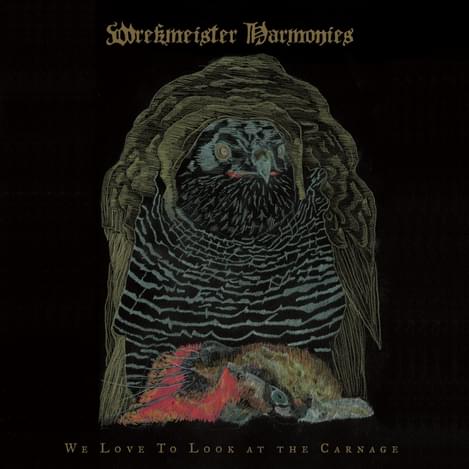Experimental collective Wrekmeister Harmonies explore even darker sonic terrain
"We Love To Look At The Carnage"

J.R. Robinson and Esther Shaw first started the project as a horrifying, metal-adjacent drone act, but have since refined and reconstructed it several times; using classic literature as inspiration, and a relentless need to evolve as the impetus. On their latest effort, We Love to Look at the Carnage, Robinson and Shaw are joined for by Thor Harris and Jamie Stewart, of Swans and Xiu Xiu respectively.
While their 2018 album, The Alone Rush, was arguably the darkest and most cathartic record the band have released – with specific focus placed on the topics of blindness, loneliness, isolation and depression – We Love to Look at the Carnage certainly gives it some competition. WLTLATC is relentlessly dark, but unlike its predecessor, it offers moments of serenity and hopefulness.
The musicianship throughout is superb; as the sonic terrain the band (and their collaborators) chart sits welcomingly, and invitingly cloaked in darkness. Throughout, Wrekmeister Harmonies offer a narrow but rich palette, but with their most spare arrangements – the addition of Harris on percussion and Stewart on electronics and vocals might suggest a busier sonic field, but in actuality, it’s anything but. Harris’ percussion is used tastefully and sporadically, in total opposition to the thunderous clangour that he provided for Swans. Stewart's voice and electronics are also used occasionally, but always fittingly. Shaw’s violin and Robinson’s guitars (and bass) are also understated, which only adds to the funereal charm of the record.
The album opens with the tense, Nick Cave-esque grandeur of “Midnight to Six”. The true saturnine depths of despair are plumbed across the seven minutes of the song, which grows outward exponentially, culminating in a monstrous crescendo. It’s a startling, ominous opener. Stewart appears as a disembodied voice on the dizzying ten-minute epic “Still Life with Prick Cancer”, which is both disconcerting and becalming in equal measure. The electronic swathes on "Coyotes of Central Park” are truly lovely, and the song is amongst the most tender the group have committed to tape.
The album concludes with two fiery, brimstone epics in “The Rat Catcher” and “Immolation”, which both feature powerful vocals and monumental instrumentation. Both are blacker-than-black takes on existential darkness, and both exemplify the particular influence of Marcus Aurelius’ Meditations on the project. The former unfolds slowly over its ten-minute runtime, while the latter is shorter, sharper and more focused in its aggression.
This is a luscious, emotionally-charged record that offers similar pleasures to those you might find in several records that are regularly acknowledged as being amongst the greatest of recent times (Swans’ The Seer, Godspeed You! Black Emperor’s Lift Your Skinny Fists Like Antennas to Heaven, Low’s Double Negative). On this evidence, Wrekmeister Harmonies deserve to be considered amongst such hallowed company, and long may their evolution continue.
Get the Best Fit take on the week in music direct to your inbox every Friday

Prima Queen
The Prize

Femi Kuti
Journey Through Life

Sunflower Bean
Mortal Primetime





